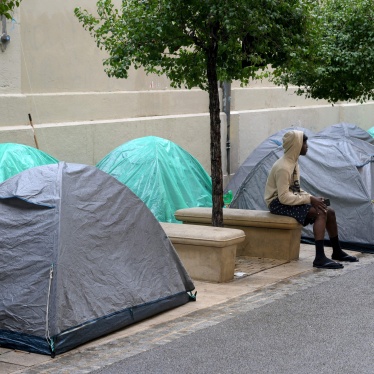Over a year after Human Rights Watch first criticized Bosnia’s failure to protect the basic rights of migrants and asylum seekers, the International Organization for Migration (IOM) is warning of a fast-developing humanitarian emergency in a makeshift camp near the border with Croatia. Over 20,000 migrants and asylum seekers have arrived in Bosnia since January 2019, but violent and unlawful pushbacks from Croatia have created a bottleneck on the border, leaving many stranded in unsafe conditions.
The Vučjak tent camp was already overcrowded with 700 migrants living without running water, electricity, or medical care. But on October 16, police transferred around 1,700 more people to the camp from Bihać, the largest town in the area.
Built on a landfill near a field of active landmines left over from the war, conditions at Vučjak were already so deplorable that IOM has refused to operate there since Bihać city administration set up the camp in June 2019. Earlier this month the United Nations Special Rapporteur for Human Rights of Migrants called the camp unlivable for humans, which the UN office in Bosnia also echoed this week, calling for the immediate relocation of all migrants to adequate accommodation. Part of the problem, Šuhret Fazlić, the mayor of Bihać, told Human Rights Watch recently, is the failure of central authorities to provide shelter that meets acceptable humanitarian standards for the roughly 6,000 migrants in his town. The Council of Europe Human Rights Commissioner urged the government to provide help to local authorities to handle the crisis in a manner compliant with human rights standards.
Fazlić is now threatening to cut services that the city has been providing to the camp, including water and sanitation. Meanwhile, the Red Cross, the only organization still operating in Vučjak, has announced it may need to halt operations due to the deteriorating situation in the camp. Bosnian authorities should act quickly to move migrants and asylum seekers from Vučjak to a place with safe and sanitary living conditions.










